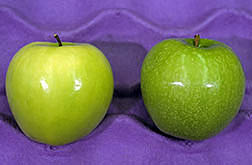Calcium Sprays: Better Fruit, Healthier Trees
|
|
Just about all commercial fruit producers in the Pacific Northwest now spray their apple and pear trees with various formulations of calcium chloride or calcium nitrate.
This very cost-effective technique, developed by Agricultural Research Service scientists at Wenatchee, Washington, yields fruit that contains at least 10 percent more calcium than unsprayed fruit.
Begun about 18 years ago by plant physiologists J. Thomas Raese and Edward A. Stahly, both now retired, the research is now directed by ARS horticulturist Stephen R. Drake.
"On Delicious and Golden Delicious apples, calcium sprays reduced the incidence of bitter pit and may also diminish scald and internal breakdown--three disorders that render some apples unmarketable," says Drake. "And in most instances, the firmness, total acidity, and juiciness ratings of apples were improved by timely applications of calcium during the growing season."
On Anjou pear trees, the sprays increased yield by 13 percent over a 6-year period and reduced the incidence of cork spot. Cork spot is not dangerous to human health, but it reduces the fruit's flavor intensity, keeping quality, and market value. Bitter pit and cork spot impart a bitter flavor to affected fruit. On Bartlett pears, calcium sprays reduced black end or hard end abnormalities by more than 50 percent.
The disorders are caused by low fruit calcium resulting from excessively warm or cold temperatures, irrigation, dormant pruning, or nitrogen fertilization.
More careful application of fertilizer and water and summer pruning may reduce damage somewhat, but the stress caused by temperature extremes in summer and winter cannot be controlled by growers.
"I strongly believe in using calcium spray on my apples," says grower Gary Vaughn of East Wenatchee, Washington. "I've even won trophies at county fairs that prove my apples are better than those from neighbors who do not spray."
Vaughn says the sprays have cut his cullage rate considerably, and he gets much better fruit coming out of storage, ready for market.
Fruit disorders and resulting lowered quality cost the industry millions of dollars in losses annually.
The Wenatchee scientists say that several different formulations of calcium chloride and calcium nitrate are available to orchardists, with label recommendations specific to various fruit crops.
Before this research, pear growers had been reluctant to spray calcium for fear that the chemical would cause blemishes on fruit and leaves, since pears are more sensitive than apples. Both late-spring and late-summer applications are necessary, but summer applications should not be made when the temperature is above 80° F.
On apples, calcium chloride is applied at 3-week intervals, June through August, at the rate of 3 pounds per 100 gallons of water. On pears, the rate is 1-½ pounds per 100 gallons. Larger trees require more spray per acre for adequate coverage.
This treatment also provides some frost protection to trees. During the winter of 1990-91, temperatures in orchards near the laboratory dropped as low as -22° F in late December. Trees that had been sprayed the previous summer produced good-quality fruit and survived, but some untreated trees were stunted and produced less fruit with more calcium-related disorders. — By Dennis Senft, ARS.
Stephen R. Drake is at the USDA-ARS Tree Fruit Research Laboratory, 1104 N. Western Ave., Wenatchee, WA 98801; phone (509) 664-2280, fax (509) 664-2287.
"Calcium Sprays: Better Fruit, Healthier Trees" was published in the April 1995 issue of Agricultural Research magazine.







